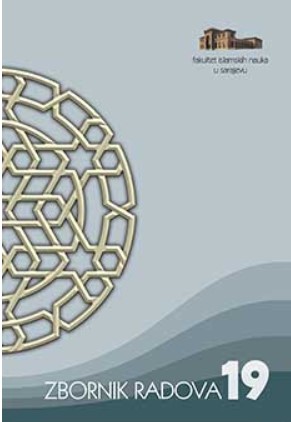UMETNUTI (EL-MUDREDŽ) KIRAETI
THE INSERTED QUR’AN RECITATION (AL-MUDRAJ)
Author(s): Dževad ŠošićSubject(s): Islam studies, Methodology and research technology, Philology, Hermeneutics, Sharia Law
Published by: Fakultet islamskih nauka u Sarajevu
Keywords: al-mudraj; shādhdh recitations; tafsir; Qur’anic text; sharia rules; codification of Mushaf; daily prayers; Qur’an recitation;
Summary/Abstract: Classical tafsir literature is rich with quotations about Qur’anic recitations known as shādhdh (irregular, non-canonical). In some cases these types of recitations shed light on the layers of meaning in the Qur’anic text, and in others they form the basis for advancing arguments in tafsir. Yet in other cases they are instruments for reaching a particular legal decision. The role of shādhdh recitations depends on their statuses in the methodological approaches of various scholars. The majority considers shādhdh to be the valid source for Qur’an interpretation and for deriving sharīʽa norms, regardless of whether they are considered as abrogated variants of recitation or credible hadith traditions. Some consider shādhdh to have the status of traditions of the Companions when it comes to Qur’anic exegesis, but that they cannot be a legitimate basis for arguing for any sharīʽa rule. The essence of different approaches to shādhdh recitations boils down to the question of what should be the principled stand in determining their origins or, put differently, in establishing their Qur’anness which they lost with the codification of the mushaf during the reign of caliph ʽUthmān, when they became textually “superfluous” in the absence of credible traditions (mutawāṭir). The mudraj recitations are a type of shādhdh recitations which is highly popular from the point of view of tafsir. They have credibility in terms of narration and were recorded in the private mushafs of some Companions. The article examines the questions whether these type of recitations are result of exegetical interpolations by some Companions or whether they are the cases of readings which appeared in the shadow of the “seven revealed letters of the Qur’an,” and how all this is reflected in various exegetical and juridical views.
Journal: Zbornik radova Fakulteta islamskih nauka u Sarajevu
- Issue Year: 2015
- Issue No: 19
- Page Range: 19-30
- Page Count: 12
- Language: Bosnian

